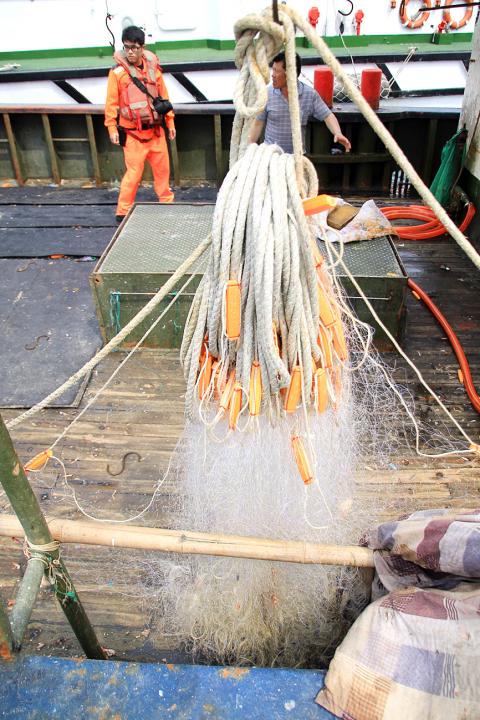Rapacious and indiscriminate fishing methods used by Chinese fishing vessels are not only damaging the marine ecology in Taiwanese territorial waters, but are also depriving Taiwanese fishermen of their source of livelihood, the Taiwan Coast Guard Administration (CGA) said.
While amendments passed in June last year increasing fines deterred Chinese fishing boats for a short time, with the number of Chinese fishing boats in the area dropping from 277 in 2014 to 79 last year, poachers have been acting in concert of late, the administration said.
Chinese ships were using bad weather to their advantage to fish illegally in Taiwanese waters, making it more difficult for the coast guard to board their ships, the CGA said, adding that a large number of vessels entered Taiwanese fishing grounds in August and used electrofishing, triple-layered gillnets, roller trawls and even poison to catch fish.

Photo: Wu Cheng-feng, Taipei Times
The administration said that in March it stopped a Chinese ship named Ching Ching Fishing 05055 south of the Pratas Islands (Dongsha Islands, 東沙群島) and found three green sea turtles, 15,000kg of coral, 400kg of giant clams and tadpole snails, as well as 40kg of toxic chemicals onboard.
Captain Huang Hsuan-kai (黃宣凱), head of the administration’s patrol force in Kinmen, said Chinese fishing boats scoured fishing grounds so thoroughly that they could in one night deprive other fishermen of a catch for three days.
Academia Sinica researcher Cheng Ming-hsiu (鄭明修) said fishing zones around the Pratas Islands and Penghu were the most severely damaged, as they were frequented by illegal fishermen from China and Vietnam.
In the past five years, the CGA has driven Chinese ships away from the two zones more than 700 times, Cheng said, adding that 90 percent of fishing resources in the region have vanished in the past 30 years.
Strong action must be taken to defend waters within 3 nautical miles (5.5km) of the coast, as such areas are typically the zones where fish and shrimp lay their eggs, Cheng said.
A recent spike in the number of crabs and shrimp in New Taipei City’s Wanli District (萬里) and Penghu shows that fish that eat young shrimp and crabs are disappearing, Cheng said, adding that if allowed to continue, the food chain would be disrupted.
Keelung Coastal Fishing Association director Lin Hsin-yung (林新永) said that Chinese ships often electrified their roller trawls, which causes great damage to marine life, as well as coral.
Lin said he had heard Chinese fishermen say that they were fishing in Taiwanese waters because their own coastal fishing supplies were running low due to the over-use of blast-fishing techniques.
Lin added that some Chinese ships try to get a cut from Taiwanese fishermen by trying to “muscle” their way into Taiwanese boats to get a share by force.

CROSS-STRAIT COLLABORATION: The new KMT chairwoman expressed interest in meeting the Chinese president from the start, but she’ll have to pay to get in Beijing allegedly agreed to let Chinese Nationalist Party (KMT) Chairwoman Cheng Li-wun (鄭麗文) meet with Chinese President Xi Jinping (習近平) around the Lunar New Year holiday next year on three conditions, including that the KMT block Taiwan’s arms purchases, a source said yesterday. Cheng has expressed interest in meeting Xi since she won the KMT’s chairmanship election in October. A source, speaking on condition of anonymity, said a consensus on a meeting was allegedly reached after two KMT vice chairmen visited China’s Taiwan Affairs Office Director Song Tao (宋濤) in China last month. Beijing allegedly gave the KMT three conditions it had to

STAYING ALERT: China this week deployed its largest maritime show of force to date in the region, prompting concern in Taipei and Tokyo, which Beijing has brushed off Deterring conflict over Taiwan is a priority, the White House said in its National Security Strategy published yesterday, which also called on Japan and South Korea to increase their defense spending to help protect the first island chain. Taiwan is strategically positioned between Northeast and Southeast Asia, and provides direct access to the second island chain, with one-third of global shipping passing through the South China Sea, the report said. Given the implications for the US economy, along with Taiwan’s dominance in semiconductors, “deterring a conflict over Taiwan, ideally by preserving military overmatch, is a priority,” it said. However, the strategy also reiterated

‘BALANCE OF POWER’: Hegseth said that the US did not want to ‘strangle’ China, but to ensure that none of Washington’s allies would be vulnerable to military aggression Washington has no intention of changing the “status quo” in the Taiwan Strait, US Secretary of Defense Pete Hegseth said on Saturday, adding that one of the US military’s main priorities is to deter China “through strength, not through confrontation.” Speaking at the annual Reagan National Defense Forum in Simi Valley, California, Hegseth outlined the US Department of Defense’s priorities under US President Donald Trump. “First, defending the US homeland and our hemisphere. Second, deterring China through strength, not confrontation. Third, increased burden sharing for us, allies and partners. And fourth, supercharging the US defense industrial base,” he said. US-China relations under

The Chien Feng IV (勁蜂, Mighty Hornet) loitering munition is on track to enter flight tests next month in connection with potential adoption by Taiwanese and US armed forces, a government source said yesterday. The kamikaze drone, which boasts a range of 1,000km, debuted at the Taipei Aerospace and Defense Technology Exhibition in September, the official said on condition of anonymity. The Chungshan Institute of Science and Technology and US-based Kratos Defense jointly developed the platform by leveraging the engine and airframe of the latter’s MQM-178 Firejet target drone, they said. The uncrewed aerial vehicle is designed to utilize an artificial intelligence computer